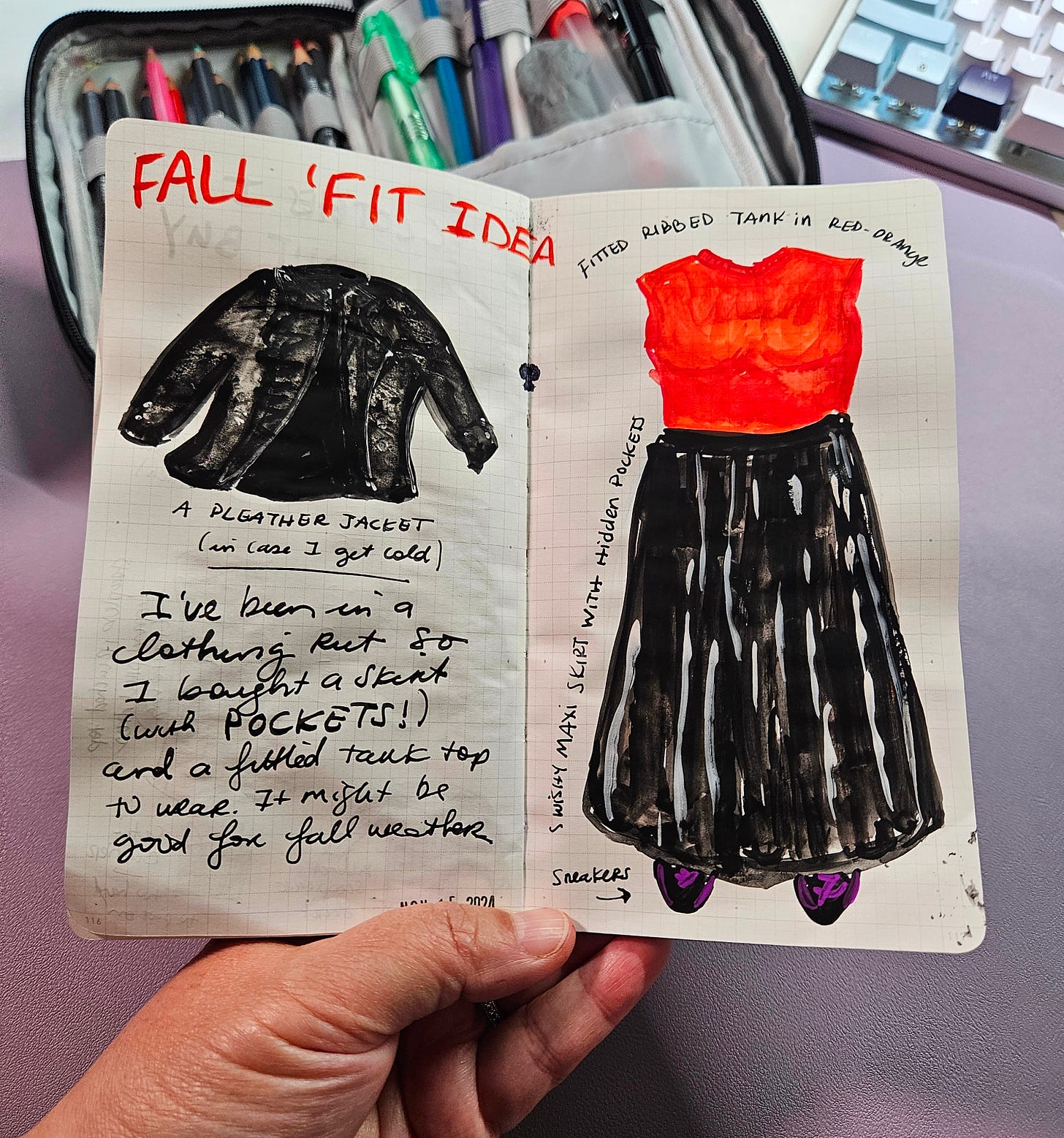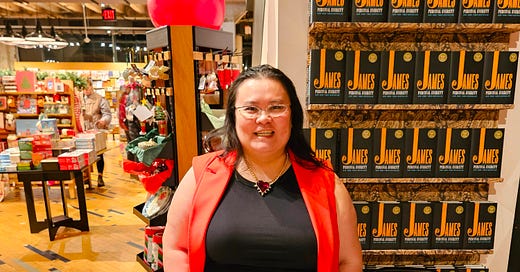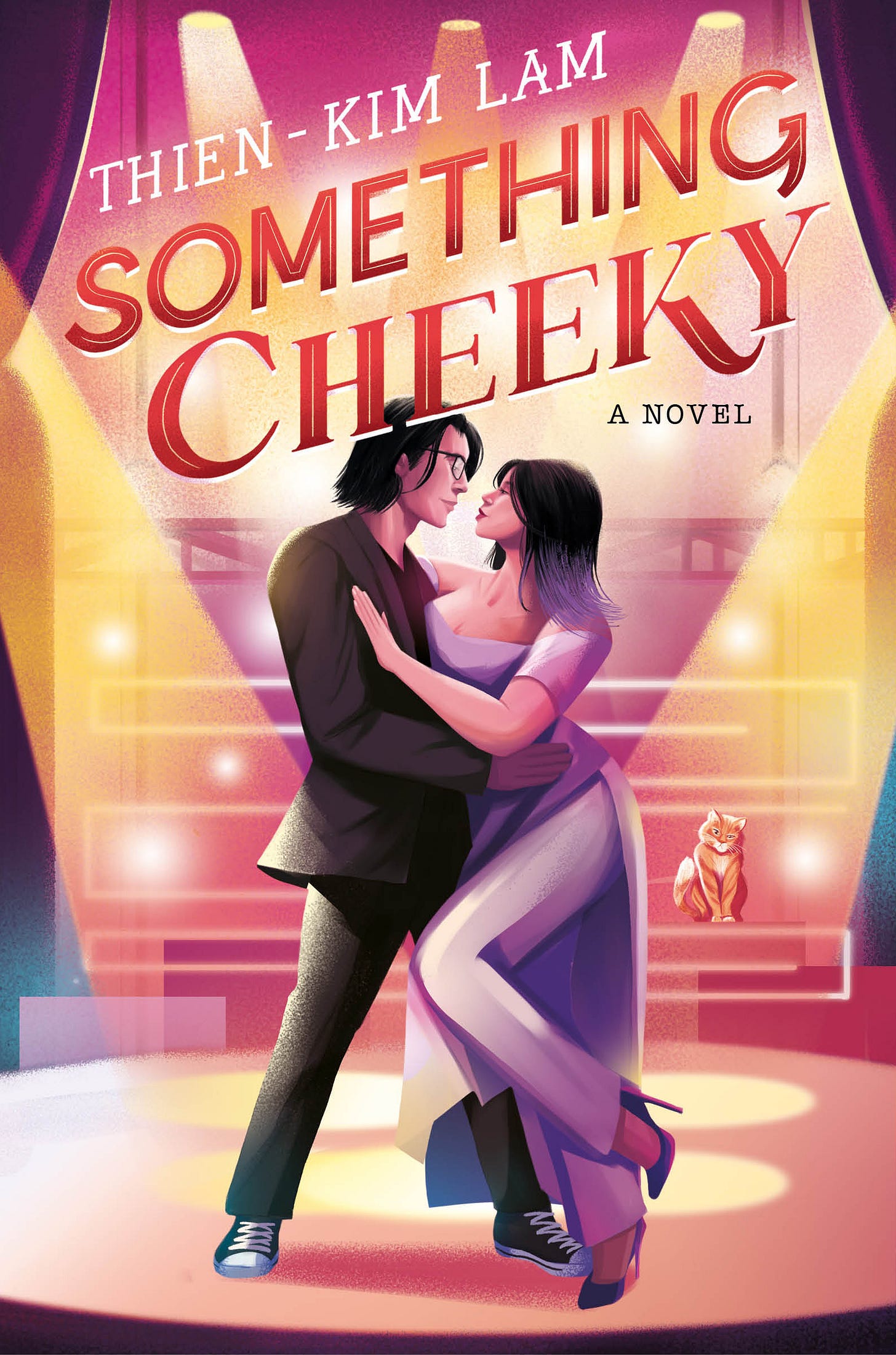Before I dive into this meaty topic (pun not intended), you can now pre-order signed copies Something Cheeky from indie bookstore Loyalty Books. Get your hands on what Paste calls it a “tender and sexy showmance.”
Content warning: Fat shaming. Skip to “Why I Call Myself Fat” section if you don’t want to read about my experience being fat shamed.
I’m fat.
I have been for most of my adult life. I’ve been called fat for longer than that. One of my formative memories about my weight is a common one for Asian folks. Every weekend our families would meet at my aunt’s home to eat and reconnect. She’d greet me in the almost the same way each time:
“Why are you so fat?” she’d ask but never expected a response.
I stared at her wordlessly since it was disrespectful to talk back. Not a skinny person herself, she’d shake her head disapprovingly.
“There’s a big pot of bún riêu on the stove. Make yourself a bowl.”
With that, I was dismissed, free to run around with my cousins, but also feeling like shit about my body and that I enjoyed food. Talk about mixed messages.
She wasn’t the only family member to deride me for my larger body size. I was put on diets as a kid and shopped from the women’s section at the department store my mother worked at because there were no plus-sized teen clothing back then.
It wasn’t until college where I realize that I was not fat in a traditional sense. I was a healthy size 12. Once I was able to shop for clothes without needing my mother’s approval, boy, did I rock that floral fuchsia silk slip dress from Express. Without a bra even. (I still have this dress even though I no longer fit in it. It holds good memories.)
College-aged men and women flirted with me which further built my confidence. Even when I gained the obligatory freshmen 15 pounds (and then some), I didn’t see myself as overweight.
Until I went home on the weekends and school breaks. Buoyed by my college friends, I’d learned to brace myself from my family’s harsh words.

Why Call Myself Fat?
In the United States, being fat is means a lack of control and or immorality. After all, fat jokes are still considered fair ground for comedians. Fat characters in literature and film are usually villains like Baron Harkonnen in Dune or Ursula in Disney’s The Little Mermaid. I even taught my kids not to call people fat because it wasn’t nice. That’s how ingrained this judgement was.
I love my fat body—stomach, rolls, and all—more now than I did back when my body was smaller. For the past fifteen years or so, my body size fluctuated between a clothing size 16-20. I’m closer to a 20 now due to the “joys” of perimenopause. It’s easier to find stylish clothes that fit compared to fifteen years ago.
I proudly call myself fat.
I reclaim fat as a descriptor without a moral judgement. The same way we describe a person as tall, short, skinny, or curvy. I didn’t understand the nuance of this until I took Writing Fat Characters at Writing the Other. I highly recommend their classes and have taught a class there as well.
Why It Took Me So Long To Write a Fat Heroine
Even though I am a fat person, I didn’t understand how to write a fat character. Before I started drafting Something Cheeky, I’d only read a handful of romance novels with fat heroines where their weight wasn’t part of the conflict. Olivia Dade (affiliate link) does a wonderful job at writing fat characters, and I learned a lot reading her books. Reading her novels empowered me as a fat woman.
I assumed that publishers and readers didn’t want to read about a fat Asian woman falling in love. Most fat women on tv or film played the best friend or existed for comic relief. They were never the lead.
When I pitched the story to my editor, she didn’t even blink at the mention of my heroine’s size. She only cared about the characters as a couple and if they seemed like they belonged together (based on my synopsis). Remember, I write contemporary romance so that’s very important in the story.
Zoe in Something Cheeky was also a best friend in my previous rom coms Happy Endings and Full Exposure. I’d created the Boss Babes friend group in hopes that I could sell it as a series.
Zoe’s character is fat from the very beginning. She designed and sold plus-sized lingerie so other fat women and femmes could feel sexy in their bodies. This was my world so, dammit, it needed a cool lingerie boutique.
Fat Women Can Be Sexy and Deserve Pleasure
I modeled Zoe’s body size to mine because I was most comfortable writing about living in a size 20-22 body. Those with larger bodies have even more challenges when it comes to fitting chairs or airplane seats and shopping for stylish clothing. I’m privileged in that I can easily find clothing to fit me at Target.
Because fat women aren’t typically depicted as sexy and happy and deserving of romantic love, I wanted multiple fat characters in my novel. They all have different life experiences and are comfortable in their bodies. Both of the fat Asian American women are sexy and have partners who find them physically attractive.
I enjoy writing sex scenes and Something Cheeky is no different. Derek can’t keep his hands off Zoe and worships her body. She has no problem sitting on top because it’s a great position for g-spot stimulation! (No spoilers but this scene is hawt.)
How You Can Support Novels with Sexy, Fat Heroines
For traditionally published books like mine, it all comes down to sales numbers. Sales lets publishers know that readers want these types of stories. Here’s how you can help:
1. Buy books with fat or skinny BIPOC main characters written by BIPOC authors. You can pre-order signed copies of Something Cheeky from Loyalty Books, my favorite DMV area indie bookstore. It’s queer-, Black-, and Asian-owned. How’s that for intersectionality?
2. Request that my library carry these books, including mine. Maybe public library have forms where you can submit purchase suggestions. If the library already has it, borrow the books. yes, digital copies and audiobooks count.
3. Tell people about these books and encourage them to purchase and/or read them.
4. Leave reviews for the books on the big sites: Goodreads, Amazon, Storygraph, etc. When people shop for our books, reviews matter. (I don’t read reviews because they’re for readers, not for authors.
How do you feel about reading or writing fat characters who embrace sex and pleasures? Tell me in the comments.







I love this sm! I've always been fat and when it comes to desire, I've felt that it was somehow wrong for me to desire someone else 'being as I was' that desiring and wanting to desire made me less than somehow, like I wasn't 'allowed to'
Octavia Butler said "You got to make your own worlds; you got to write yourself in" and it's taken me a long time to learn how to love my body enough to write it in Thank you for sharing!!
Such a great post. I can't wait to read Something Cheeky. As a plus-size gal myself and I wasn't always, it's been hard to find love for how my body has changed and grown, but love to see books that show women empowered by their bodies. Thank you!